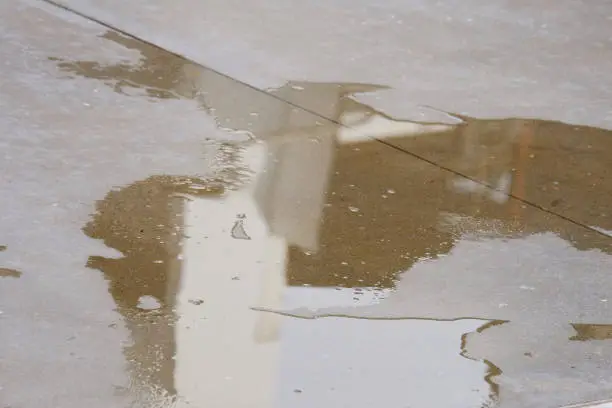New York City is known for its diverse weather patterns, ranging from heavy rains to snowstorms. While the city’s charm is undeniable, these weather conditions can create significant challenges for homeowners, particularly when it comes to basement water issues. Understanding the common causes of water in your basement and the importance of proper waterproofing can save you from costly repairs and ensure the safety and value of your home.
Understanding Basement Waterproofing
Basement waterproofing is the process of protecting your basement from water infiltration, which can lead to serious structural and health issues if left unaddressed. Effective waterproofing involves a combination of techniques, such as sealing cracks, installing drainage systems, and applying waterproof coatings. Whether you’re dealing with minor dampness or major flooding, investing in professional basement waterproofing is crucial for maintaining a dry and healthy living space.
Useful link:
What is waterproofing?
Common Causes of Water Damage
Poor Grading and Drainage
One of the most common reasons for basement water issues in NYC is poor grading and drainage around your home. If the land around your foundation slopes towards the house, water can easily pool around the foundation and eventually seep into the basement.
Solution: Ensure that the ground around your home is properly graded to direct water away from the foundation. Additionally, consider installing or maintaining gutters and downspouts to efficiently channel rainwater away from your home.
Cracks in Foundation Walls and Floors
Over time, the foundation of your home may develop cracks due to natural settling or external pressure from soil and water. These cracks provide an easy entry point for water, leading to dampness or flooding in your basement.
Solution: Regularly inspect your foundation for any visible cracks. If you find any, it’s important to seal them with appropriate materials, or better yet, hire a professional waterproofing contractor to assess and repair the damage.
Faulty or Clogged Gutters and Downspouts
Gutters and downspouts play a vital role in directing water away from your home. When they are clogged or malfunctioning, water can overflow and accumulate near your foundation, increasing the risk of basement water problems.
Solution: Regularly clean and inspect your gutters and downspouts to ensure they are functioning properly. Consider installing gutter guards to prevent debris buildup and extend the lifespan of your drainage system.
Hydrostatic Pressure
Hydrostatic pressure occurs when groundwater accumulates around your foundation, exerting pressure on the walls and floors of your basement. This pressure can force water through any cracks or openings, leading to moisture problems.
Solution: To mitigate hydrostatic pressure, consider installing a sump pump to remove excess water from around your foundation. Additionally, waterproofing your basement walls and floors with specialized coatings can help resist water infiltration.
Leaky Windows and Doors
Basement windows and doors, especially those that are old or improperly installed, can be a significant source of water entry. Leaks around these openings can lead to persistent dampness and mold growth in your basement.
Solution: Inspect your basement windows and doors for any signs of leaks or wear. Seal gaps with weatherproofing materials, or replace old windows and doors with newer, more efficient models designed to resist water intrusion.
Plumbing Leaks
Sometimes, the cause of basement water isn’t external but comes from within the home. Leaky pipes, water heaters, or appliances located in or above the basement can lead to water damage over time.
Solution: Regularly inspect your plumbing system for leaks, corrosion, or other signs of wear. Address any issues promptly to prevent water from seeping into your basement and causing damage.
Signs of Basement Water Problems
Identifying the early signs of water issues in your basement can prevent small problems from becoming major headaches. Here are some common indicators:
- Damp or Musty Odors: A persistent musty smell often indicates moisture problems, even if water isn’t visibly present.
- Water Stains: Look for discoloration on walls, floors, or ceilings, which can signal past or ongoing water infiltration.
- Efflorescence: This white, powdery residue on basement walls is a sign of mineral deposits left behind by evaporating water.
- Mold and Mildew: The presence of mold or mildew is a clear indication of excess moisture in your basement.
- Peeling Paint or Wallpaper: Moisture can cause paint or wallpaper to bubble, peel, or blister.
Hiring a Professional Waterproofing Contractor in NYC
Given the complexities of basement waterproofing, especially in a city like NYC with its unique climate and building structures, it’s often best to go for a qualified waterproofing contractor. A qualified contractor can assess your basement, identify the root causes of water issues, and implement effective solutions tailored to your home’s needs.
Conclusion:
Water in your basement can lead to serious structural damage, health hazards, and decreased property value. By understanding the common causes of water infiltration and taking proactive steps to waterproof your basement, you can protect your NYC home from these risks. Whether you’re dealing with minor dampness or significant flooding, hiring a professional waterproofing contractor is the best way to ensure long-lasting protection for your home.
Home


